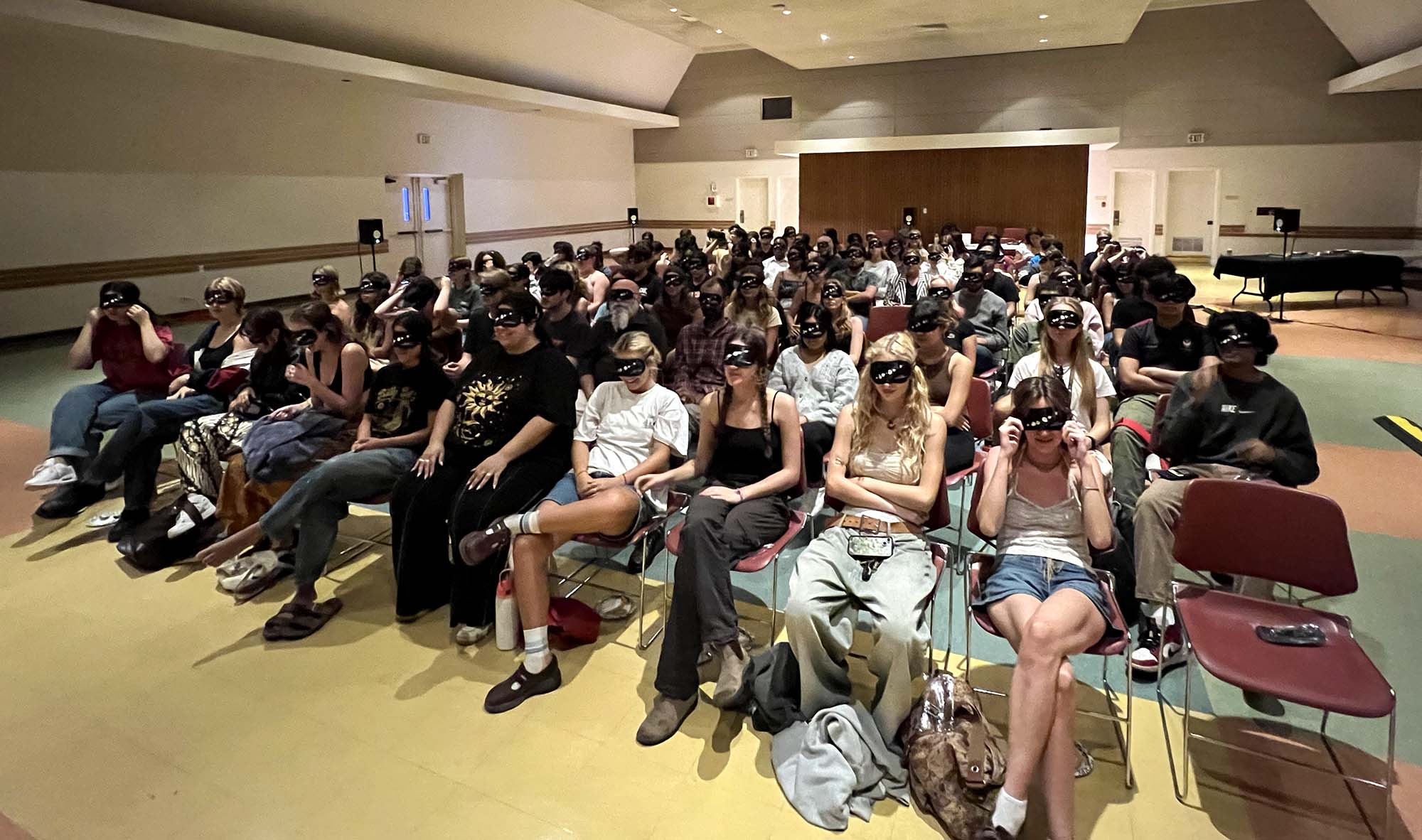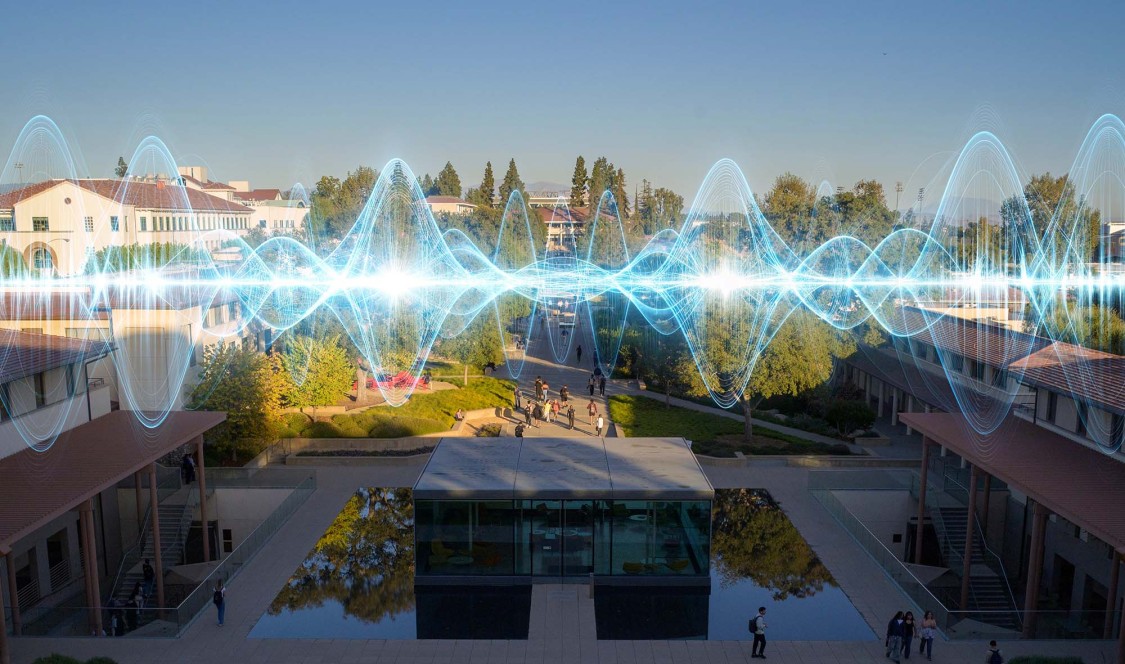Release Schedule for
“The Imaginary”
Monday, December 2
Episode 1: The Poetry of Perception
Media are increasingly monopolizing attention: Your mind is prevented from wandering, from generating thoughts, having associations, coming up with ideas. Over time, this dulls the creative faculties and weakens the power of imagination, which is essential for the creation of art…as well as for a clear perception of reality.
featuring Radhika Koul, Assistant Professor of Literature and Mellon Emerging Scholar
Thursday, December 5
Episode 2: The Knowledge Argument
If a person spends their entire life seeing only in black and white, is it possible for them to truly know what it would be like to experience color? Philosophers have debated this for decades, but one thing they have often overlooked is the power of the imagination. It is a skill, and like any other skill it can be honed, perhaps enough to allow one to achieve deep knowledge of an experience they’ve never had.
featuring Amy Kind, Russell K. Pitzer Professor of Philosophy and Director of the Gould Center
Monday, December 9
Episode 3: Utopia
Would a fool-proof utopia be so boring and trouble-free that there would be no outlet for creativity and imagination?
featuring John Farrell, Waldo W. Neikirk Professor of Literature
Thursday, December 12
Episode 4: Imagining the Constitution
While the U.S. Constitution is constantly invoked to justify how the country should be governed, it actually provides very few specifics on how that should be done. Instead, the designed ambiguities of the document require the imaginative powers of its citizenry to interpret it and decide which laws should be implemented and how they should be enforced.
featuring George Thomas, Burnet C. Wohlford Professor of American Political Institutions
Claremont McKenna professors trace the role of the imagination in philosophy, literature, and political science—from reader response theory and the Knowledge Argument, to the Experience Machine and the intentional ambiguity of the U.S. Constitution—in a new podcast series called “The Imaginary.”
The Gould Center for Humanistic Studies and the Salvatori Center partnered with The World According to Sound (WATS) to produce the four-episode audio series, set for release in December.
Each episode explores a thought-provoking question whose answer lies in how we use our imaginations:
- How does the Hamlet you picture in your head compare to the one Shakespeare envisioned?
- Could a person who has only ever seen the world in black and white accurately conceive of what it is like to perceive color?
- Would a fool-proof utopia be so boring and trouble-free that there would be no outlet for creativity and imagination?
- How are competing interpretations of the U.S. Constitution threatening the union?
“Chris Hoff and Sam Hartnett at The World According to Sound reached out to the Gould Center because they were looking for humanities centers to partner with,” said Amy Kind, Russell K. Pitzer Professor of Philosophy and director of the Gould Center. “Over the last few years, they’ve been producing a series of podcasts, Ways of Knowing, relating to the humanities with different colleges and universities.”
“Their basic strategy is to take a unique auditory approach to telling stories about humanistic research, and it sounded really cool to us, and so we decided to pursue it,” Kind added.
That’s right. These are not your typical podcasts.
After years in public radio, Hoff and Hartnett started WATS to break the mold. “We wanted to make a radio show that didn’t tell you a story or what to think: a show that is all about sound instead of language and narrative, where the point isn’t to hook you with a story, or to package up some quirky character you can admire, but to get deep into a sound and play a long, non-narrated stretch so you can really lose yourself,” the producers explained on their website.
“I’ll give you an example,” Kind said. “The episode that focused on my work, on imagination and philosophy of mind, revolves around a famous thought experiment called the Knowledge Argument by philosopher Frank Jackson. You imagine a famous color scientist who's been locked in a black-and-white room her entire life, and she learns everything she knows about color science in the room by watching black-and-white videos or reading black-and-white texts. But she's never seen color. And then when she’s finally released from the room and she sees a red tomato, she learns something new, right? She kind of has this ‘aha’ moment.”
“In the podcast, Chris and Sam reconceptualized the thought experiment in the world of sound. They translated it to, what if someone had only heard static their whole life, and when they finally hear some non-static sounds for the first time, do they learn something new? And so the episode starts with a lot of bursts of static of different forms to bring you into the world as an auditory thought experiment. I think it's really cool and interesting the way that Chris and Sam do creative things with audio and reject the more traditional formats of edutainment.”
Kind saw the opportunity to partner with WATS on the podcast as a way to highlight some of the research of CMC’s humanities professors and others working on humanistic issues.
“There’s really a lot of intense intellectual vitality inherent in what our professors are doing, and I think bringing that to the CMC community and the public is really important. I think it’s important for students to learn about what their professors are working on and to see how these fit into broader issues in the world today.”
The project, which received additional funding from the Salvatori Center, also relates closely to the mission of the Gould Center, Kind said. “Part of the mission statement of the Gould Center is to understand and develop the power and use of the imagination. Focusing on this topic for the podcast was a very natural fit for us.”
Other professors featured in the series include: Radhika Koul, assistant professor of literature and Mellon Emerging Scholar; George Thomas, Burnet C. Wohlford Professor of American Political Institutions; and John Farrell, Waldo W. Neikirk Professor of Literature.
The podcast featuring Farrell’s work follows from his recent book, The Utopian Dilemma in the Western Political Imagination, and took off from a thought experiment invented by the philosopher Robert Nozick.
“Nozick asked his readers to imagine being hooked up to an ‘experience machine’ (technologically like what you see in The Matrix) which would fulfill all their desires without danger or cost,” Farrell said. “And he took it as a strike against utopian thinking that, according to the evidence available to him at the time, the majority of people would refuse to hook up, suggesting, for Nozick, that human beings aren’t fundamentally hedonistic. This was a way of getting into our discussion about the ambivalent appeal of utopianism and even of happiness itself.”

The experience was interesting to Farrell on a number of levels. “My conversations with Sam and Chris were very rich and wide-ranging but had to be condensed and filtered. Hearing my confident pronouncements being inserted into a new context gave me a new appreciation of how hard it is not to sound simple-minded in media snippets,” he said. “On the other hand, it was spookily fun to hear my notions being enhanced with sound effects and audio clips from movies. The students in my class on utopian literature gave me helpful feedback.”
Last year, WATS presented a podcasting workshop for students at the Gould Center and produced two audio shows on campus. Anyone who attended those immersive sound experiences in McKenna Auditorium—in the dark, with eye masks on, hearing sounds travel back and forth across the room—will know right away they are in for something completely different with these podcasts.
“The partnership between the Gould Center and the WATS team has been broader than just the podcast series ‘The Imaginary,’” Kind said, “but this podcast series is really at the heart of the partnership, and it’s what brought the whole partnership together.”

